 |
 |
 |
 |
 |
 |
ipemanoticias@gmail.com
(55)(12) 3848 2682
Contact us from:
8 - 12 e 14 -17, Monday to Friday
Please book an appointment before coming.
We are located in Ubatuba, north coast of São Paulo, Brasil.
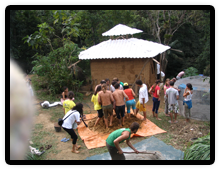
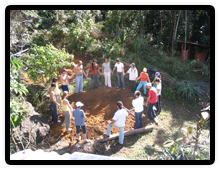
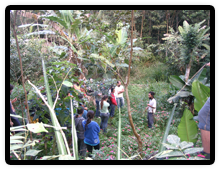
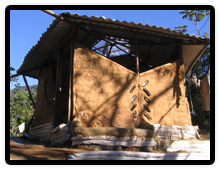
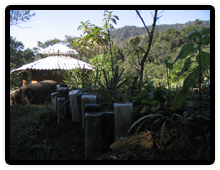
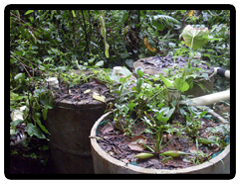
Permaculture is a practical concept applicable from the balcony to the farm, from the city to the wilderness. It enables people to establish productive environments providing for food, energy, shelter, material and non-material needs, as well as the social and economic infrastructures which support them. Permaculture means thinking carefully about our environment, our use of resources and how we supply our needs. It aims to create systems that will sustain not only for the present, but for future generations.
definition from Permaculture International Journal
Permaculture is...
a globally recognised environmental design methodology. The founders of Permaculture, Bill Mollison and David Holmgren, coined the term 25 years ago. Now there are over 4000 independently operated projects in 120 countries
the conscious design and maintenance of agriculturally productive systems which have the DIVERSITY, STABILITY, RESILIENCE & CREATIVITY of natural eco-systems (cultivated ecosystems)
a whole systems approach to ecological planning and design - a way of thinking, based on a positive and creative solution-finding, that provides tools for working towards long term sustainability
a holistic ecological approach to the design and development of human settlements takes into account food production, structures, technologies, energy, natural resources, landscape, animal systems, plant systems, and social and economic structures.
applicable to both urban and rural contexts, and to any scale of design.
about working with, rather than against, nature. It provides us with the tools to satisfy our needs in a way that sustains the earth, future generations and ourselves.
inspired by traditional wisdom, especially the sustainable farming cultures of Asia, India and Africa and incorporates new appropriate methods and technologies.
concerned with the restoration of soil as a priority (Healthy Soil = Healthy Plants = Healthy Food = Healthy People)
based on the environmental ethics and principles of design and close observation of nature rather than a set of techniques. These ethics and principles draw from a broad across-section of disciplines. The aim is to create beneficial and supportive relationships between elements in the landscape that recognise the interconnectedness and diversity of the natural world. It calls for a move from monoculture to polyculture.
PERMACULTURE aims to assist people and communities to develop ecoliteracy (ecological literacy) and ecodesign skills and work towards more sustainable ways of living. Permaculture teaches, amongst other things, how toÉ.
Observe nature and become more ecologically aware and responsible
Restore the land, forests, waterways and local ecologies
Grow fresh healthy chemical-free food
Maintain and improve soil fertility and prevent erosion
Use water wisely Ð collection, storage, reusing, cleansing
Reduce pollution and waste and utilise resources responsibly
Plan and design sustainable houses and human settlements
Strengthen the local economy, create local employment and work co-operatively
Build on strengths and abundances within the bioregion
Share this knowledge with others.
There is not one single solution to the problems we face but the universal applicability of the principles of Permaculture enable us to find solutions that are location and needs specific.